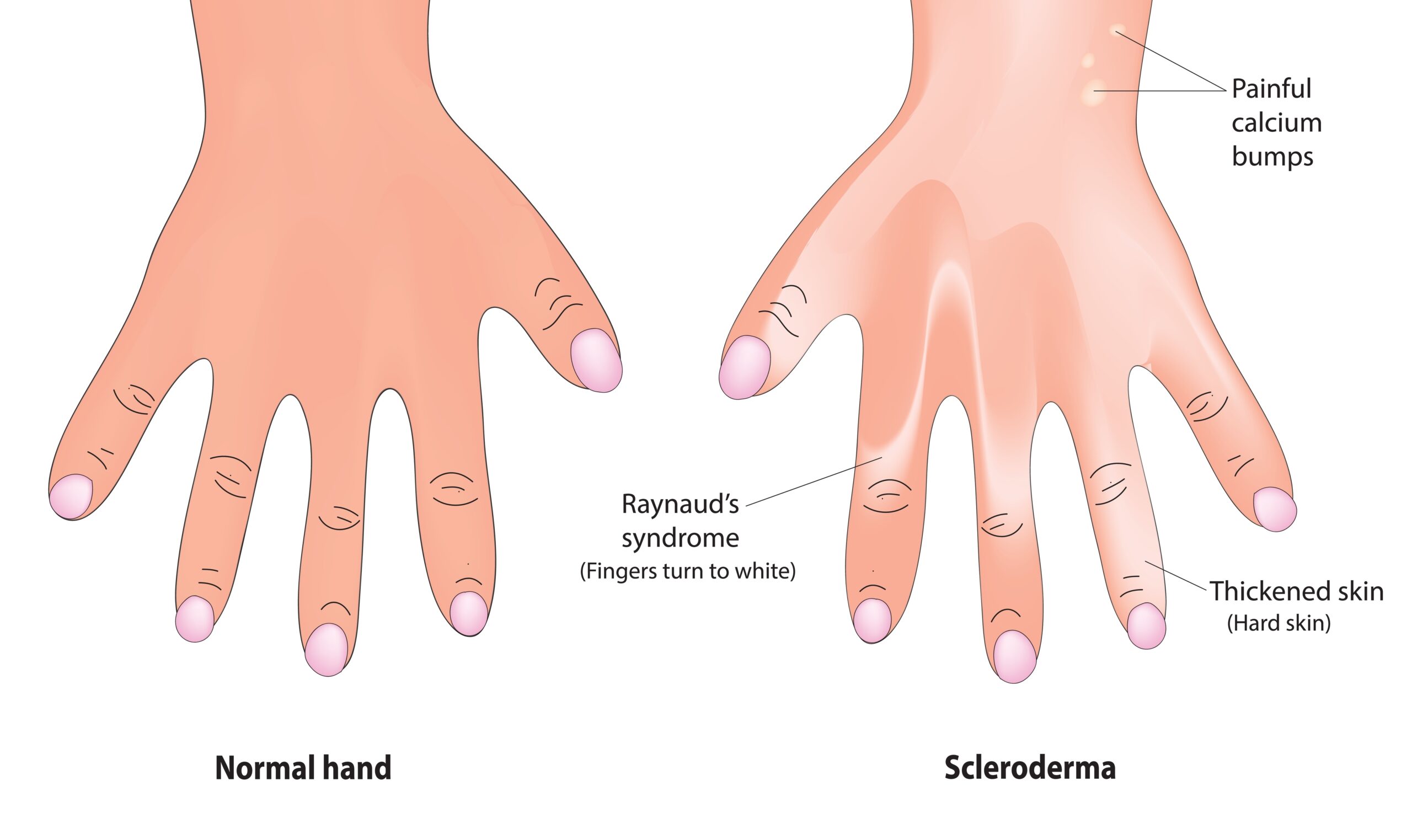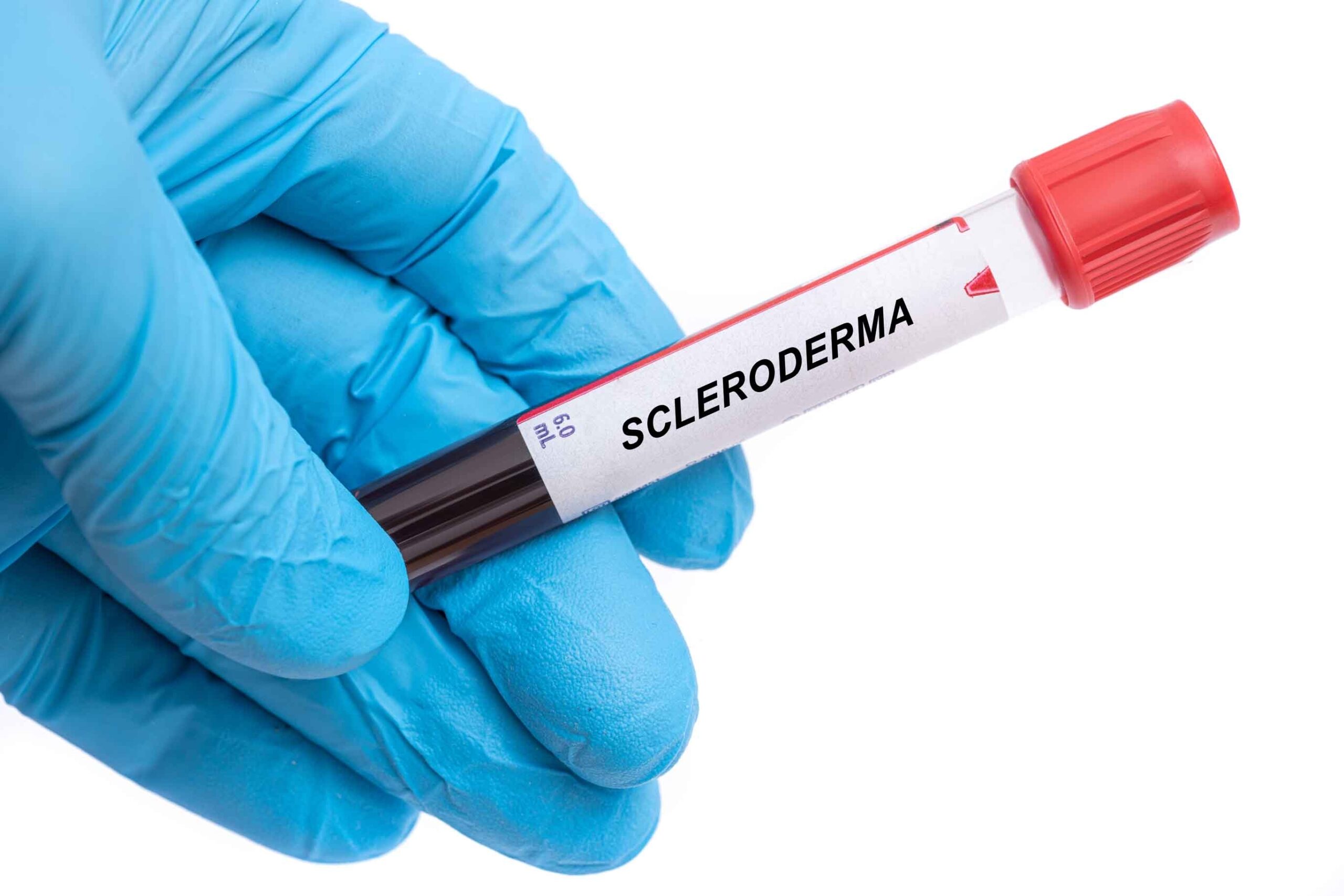Scleroderma (sclerosis) is a chronic autoimmune disease. Autoimmune means that the body’s immune system starts attacking body cells, and chronic means that it lasts for a long time, possibly for the rest of the affected person’s life. The disease affects connective tissue, found all over the body, supporting organs, and holding tissues together. Scleroderma leads to progressive skin and organ hardening, which disturbs their functioning.
Scleroderma's progression is unique to each individual, leading to various complications for each person affected by the disease. Although it usually affects the skin, symptoms can appear in any body part. During the disease, the body starts to produce and accumulate too much collagen, thickening tissue. Collagen is a protein essential for the body’s correct functioning. However, when it is overproduced, the tissues become thicker and more fibrous than they should.

There are several types of scleroderma. Physicians distinguish two main types of the condition: localized and systemic.
A localized type (sometimes called morphea![]() ) of the disease is only present in one place on the body, usually the skin. Skin lesions are typically noticed in the hands and feet and then progress slowly upwards. In most cases, lesions don’t extend beyond the knees and elbows. They are itchy and tender. With time, lesions develop a hard center with a violet border. This type can occur both in children and adults.
) of the disease is only present in one place on the body, usually the skin. Skin lesions are typically noticed in the hands and feet and then progress slowly upwards. In most cases, lesions don’t extend beyond the knees and elbows. They are itchy and tender. With time, lesions develop a hard center with a violet border. This type can occur both in children and adults.
Additionally, symptoms such as weakness, sudden redness, and finger pain (Raynaud’s phenomenon) may occur. Most skin lesions resolve independently in a few years but can leave skin discolored.
Several subtypes of localized scleroderma have different affected areas and complications, such as joint abnormalities. In the subtype called linear morphea![]() , skin lesions appear as thick lines around legs and arms, which may cause long-lasting problems with bones and limbs.
, skin lesions appear as thick lines around legs and arms, which may cause long-lasting problems with bones and limbs.
In the systemic type, the disease affects organs and skin lesions. Skin lesions may appear on hands, arms, torso, and thighs. Thickening of the skin progresses quickly. Affected organs may include the lungs, kidneys (an organ that produces pee), heart, and digestive system. Usually, the more advanced the skin lesions, the more severe the organ symptoms.
The condition can be fatal. It may limit your ability to breathe or digest, leading to severe complications.
Doctors distinguish three subtypes of systemic scleroderma![]() . Those include:
. Those include:
Scleroderma is an autoimmune disease, meaning the immune system produces antibodies that attack body organs. The exact cause of why the body starts producing those antibodies is not known. Experts suspect that the role in its development may play genetic and environmental![]() factors. Environmental factors may include virus infections, exposure to chemicals, and pollution.
factors. Environmental factors may include virus infections, exposure to chemicals, and pollution.
Scleroderma is rare. Each year, around 1 in 100,000![]() people develop the condition. It is more common in women than in men. The average age at which the condition develops is 30-50, but it can develop at any age.
people develop the condition. It is more common in women than in men. The average age at which the condition develops is 30-50, but it can develop at any age.
The symptoms of the condition depend on the affected organs. They result from ongoing hardening of the tissues and problems with blood vessels. The main signs you'll notice include:
If this condition affects different parts of your body or types of this illness, you might see some other signs, too.

The biggest thing you'll see with this illness is changes to the skin. It gets thick and stiff, doesn't stretch like it used to, and might change color. When skin discolorations are surrounded by lighter skin, experts usually call it a “salt and pepper”![]() appearance. Other skin changes include swelling of the fingers and skin atrophy, which is a waste away of the tissue. Additionally, calcium deposits can appear in the skin, which looks like white lumps.
appearance. Other skin changes include swelling of the fingers and skin atrophy, which is a waste away of the tissue. Additionally, calcium deposits can appear in the skin, which looks like white lumps.
Fingers and toes may become swollen, stiff, and tight, and joints of the hands and feet can become stiff and painful. Changes start at the fingertips and spread upwards.
When the face is affected, it might become tight, with loose facial expressions, and have difficulty opening the mouth or closing the eyelids. Some small blood vessels might become visible under the skin, causing discoloration.
Raynaud’s symptom is a finger blood vessel spasm. It is usually triggered by the cold or stress but can also happen independently. The symptom starts with sudden paleness and numbness in the fingers. Then, they turn bluish and painful. Finally, fingers get red with a burning sensation when a blood vessel spasm passes.
Joint pains may appear in all types of scleroderma and are caused by inflammation. Joints can become stiff, especially in the morning. Muscles can become weak and painful because of the muscle tissue’s ongoing hardening in some types of disease.
The systemic type of disease causes symptoms in the skin and organs. Skin changes typically affect more extensive areas, with Raynaud’s syndrome present. Affected organs may include:
Some people are at a higher risk for sclerosis development. The risk factors include:
Although experts distinguish factors that raise the chances of sclerosis development, it is impossible to prevent the condition as the exact cause of the disease remains unknown.
Dermatologists and rheumatologists typically diagnose scleroderma. Dermatologists treat conditions affecting the skin, and rheumatologists treat joint and autoimmune diseases. The disease is challenging to diagnose as it is rare, and the symptoms are similar to those in other conditions.
First, the doctor assesses your symptoms and asks about a family history of autoimmune conditions. Next, the physician performs a physical exam and may order some tests:

There is no cure for scleroderma. However, medications, physical therapy, and lifestyle changes can alleviate symptoms and help prevent complications.
Managing symptoms of scleroderma involves multiple medications, as the disease may affect any body part. If you have scleroderma, the following medications![]() may be prescribed to you by your physicians:
may be prescribed to you by your physicians:
Physical therapy is super important when you're dealing with scleroderma. It includes different exercises and treatments that keep you moving and reduce stiffness. It also helps you do everyday things by yourself.
There are things you can do that might slow down the disease and make your symptoms easier to handle. For example:
People with scleroderma are much more likely to develop Sjögren’s syndrome![]() , another autoimmune condition where salivary and tear glands aren’t working as they should, leading to dry mouth and eyes. Other complications
, another autoimmune condition where salivary and tear glands aren’t working as they should, leading to dry mouth and eyes. Other complications![]() that might occur include:
that might occur include:
Sometimes, complications of the condition may be life-threatening. If you experience any symptoms that may suggest that conditions such as kidney failure or a heart attack are developing, call for emergency medical attention. Symptoms that should especially worry you include chest pain, very high blood pressure, shortness of breath, difficulty swallowing, or sudden loss of consciousness.
Scleroderma is a chronic autoimmune condition. It cannot be completely cured, and the exact cause is unknown. Once the disease damages the tissue, it’s irreversible.
The treatment aims at alleviating symptoms and preventing complications.
If you notice symptoms of scleroderma, such as Raynaud’s symptoms or hardening of the skin on your hands and feet, you should contact your doctor. The most characteristic symptoms of the disease are skin changes. Symptoms such as muscle or joint pain can be present in several conditions, but it is a good idea to mention it to your physician if you’re experiencing it.
If you have been diagnosed with scleroderma and experience symptoms such as very high blood pressure, vision problems, chest pain, or consciousness disorders, contact emergency medical help as it may suggest you developed life-threatening complications of your condition.